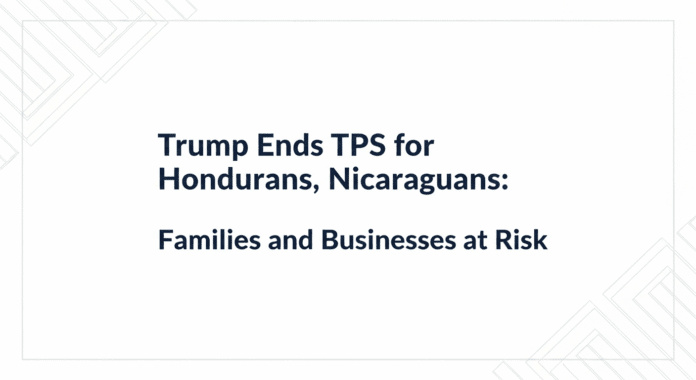Trump Ends TPS for Hondurans and Nicaraguans, Sparking Fears for Families and Businesses
Thousands face an uncertain future as immigration policy shifts under Trump’s mandate
The Trump administration’s decision to terminate Temporary Protected Status (TPS) for over 70,000 Hondurans and 4,000 Nicaraguans has shocked immigrant communities and U.S. businesses alike. With the cutoff set for September 6, 2025, this policy change not only disrupts the lives of people who have built careers and raised families in America but also challenges the integrity of longstanding immigration traditions. The move, defended by Homeland Security Secretary Kristi Noem who claims that conditions in Honduras and Nicaragua have improved, has ignited fierce debate. Critics like Senator Catherine Cortez Masto warn of family separations and economic fallout across key industries. This article explores the background of TPS, details the administration’s rationale, highlights the reactions from diverse groups, and examines the wider economic and social consequences of ending TPS.
Understanding Temporary Protected Status (TPS)
A Humanitarian Lifeline
Temporary Protected Status was created in 1990 to offer refuge to those fleeing armed conflict, natural disasters, or extraordinary conditions in their home countries. It allows recipients to live and work legally in the United States on a temporary basis. Established in 1999, TPS was granted to Hondurans and Nicaraguans following the devastation of Hurricane Mitch, an event that upended entire communities across Central America. Although TPS does not lead directly to permanent residency, it has provided the stability needed for immigrants to forge successful lives in their new home.
The Legal Framework Behind TPS
TPS is designated for limited periods, subject to review every 18 months. The program was never intended as a long-term solution but rather as a temporary relief measure during times of crisis. Over the past two decades, TPS has allowed tens of thousands to work, pay taxes, and contribute to the socioeconomic fabric of the United States. In many communities, TPS holders have become integral to industries such as construction, agriculture, and hospitality.
The Administration’s Decision: Policy Rationale
Official Statements and Policy Shifts
On May 6, 2025, Homeland Security Secretary Kristi Noem announced that TPS would end for Hondurans and Nicaraguans. “The conditions that originally warranted TPS have noticeably improved,” Noem stated. “Our immigration program must reflect that TPS was always meant to be temporary.” The directive, effective September 6, 2025, is part of a broader Trump administration strategy to tighten U.S. immigration controls and restore a stricter interpretation of immigration law.
In support of the decision, the administration has introduced measures to ease voluntary repatriation. Affected individuals are being offered free plane tickets and financial incentives if they choose to return to their home countries. Nevertheless, this mechanistic approach has raised significant concerns about the human cost of such policies.
The Argument for Restoring the Rule of Law
Proponents of the termination argue that indefinitely extending TPS stretches the program beyond its original intent. They contend that bringing TPS to an end is necessary to encourage lawful immigration and reassert the primacy of legal pathways. However, critics counter that this so-called restoration of law and order disregards the decades-long contributions of TPS holders and the realities of family life and economic interdependence that have developed in the United States.
Who Is Affected?
Economic Contributors at Risk
Approximately 72,000 Hondurans and 4,000 Nicaraguans have built their lives in the United States under TPS. Over many years, these workers have become a fundamental part of industries that rely on skilled labor. Studies estimate that TPS holders contribute billions of dollars to the U.S. economy each year through their participation in the workforce and consumer spending. For example, sectors such as construction and hospitality, which already struggle with labor shortages, could face significant disruptions if these workers lose their ability to work legally.
Families and Community Impact
A critical aspect of the debate involves family separations. Many TPS holders have U.S.-born children who are citizens and who depend on family unity for emotional and social stability. Immigration advocates warn that removing parents from families could lead to widespread hardship for children and destabilize communities that have long integrated TPS holders into their social fabric.
Perspectives from Lawmakers and Advocates
U.S. Senator Catherine Cortez Masto of Nevada has been a vocal critic of the decision. “Ending TPS for these individuals will tear families apart and harm American businesses,” she remarked. Her statement reflects deep-seated concerns that the termination policy does little to enhance security while inflicting real pain on family units. Immigrant rights organizations across the nation have decried the move as both inhumane and economically shortsighted. Advocates argue that many of those targeted by the decision have been in the United States for decades, contributing significantly to their local communities and industries.
Economic and Social Implications
Income, Taxes, and Industry Dependence
TPS holders contribute substantially to state and local tax revenues, and their hard work supports industries vital to the U.S. economy. The American Immigration Council reports that the deportation of TPS holders could cost employers millions in lost labor and training expenses. The sudden shortage of experienced workers in key sectors may lead to increased labor costs, production delays, and a negative ripple effect on the broader economy.
The Human Cost of Deportation
The social consequences are equally dire. Imagine families with strong American ties, where one parent may be forced back to a homeland they barely remember. Many TPS holders risk losing their ability to provide for their families, leading to emotional stress, economic instability, and fractured community bonds. For instance, Maria, a Honduran TPS holder from Texas, stated, “We built our lives here. My children are American. The thought of being separated from them is unbearable.”
The Broader Debate over Immigration Reform
The policy also plays into a larger national debate on immigration reform. On one side, supporters say that strict adherence to temporary measures reinforces the rule of law. On the other, critics emphasize that humane considerations and the long-term contributions of immigrants must shape immigration policy. With legal challenges and protest rallies emerging nationwide, the policy is likely to remain a contentious issue as the deadline for TPS termination looms.
What Happens Next?
Navigating an Uncertain Future
For the individuals affected, the coming months are fraught with anxiety and difficult decisions. Many are seeking legal counsel and urging elected officials to reconsider the sweeping nature of the policy change. As legal challenges are expected to mount, community organizations continue to mobilize, calling for legislative action that would offer a permanent solution to the TPS holders’ plight.
Looking Ahead: Legal and Political Battles
The termination of TPS has already prompted discussions in Congress about potential legislative remedies. Advocates are hopeful that bipartisan efforts can result in a law that protects those who have become part of the American community. In the meantime, legal battles may delay the immediate impact of the policy change, offering a glimmer of hope for those facing deportation.
Reflecting on America’s Values
The decision to terminate TPS for Hondurans and Nicaraguans marks a pivotal moment in America’s ongoing immigration debate. While the administration argues that ending TPS is a necessary measure to restore the temporary nature of humanitarian relief, the very real economic and human costs cannot be ignored. Families risk separation, communities face disruption, and businesses may experience significant setbacks. As this debate unfolds in courtrooms and on Capitol Hill, readers are encouraged to stay informed, engage in constructive dialogue, and urge lawmakers to pursue solutions that balance the letter of the law with the spirit of compassion. It is our collective responsibility to ensure that America’s policies reflect the values of fairness, opportunity, and hope for all.
Call to action: Stay engaged by signing petitions, reaching out to local representatives, and supporting immigrant rights groups that advocate for fair and just immigration policies.




